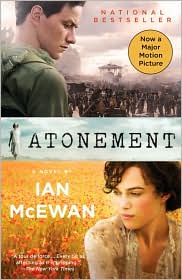For the first actual book post, I have finished Atonement by Ian McEwan.
...And you didn't even know I had started!
This was a book that was put on my TBR list a while ago because the people on Rory's Book Club had gone ape over it, so onto the list it went. It was on the new books shelf of the library, so I got it. I had no idea what it was about, but if so many people liked it and my library actually had it, it had to be good.
Plus, I was the first person to ever check that book out. The yellow sticker is starting to peel off of the spine because it took me way longer to read than I expected.
I had been told that Atonement was similar to Pride and Prejudice, which isn't a good thing. I've tried twice to read P&P but I never got past chapter 6 or 7. It was too boring. If a book is boring, I don't read it. This book was boring, but not as boring as a Tale of Two Cities or the Scarlet Letter (the only two school books I didn't read).
It took me a great deal of patience to finish this book. It wasn't one of my favorites, but I found myself kind of fascinated by it. How the conflict of the book was something...you know...but wasn't vulgar or profane. Shakespeare is more up front about "it" than Atonement is.
The story line is a bit complicated to explain, so here's what Barnes and Noble has to say about it:
"On an English country estate in the jittery, gilded era between the two great wars, two young people stand in the summer's heat, arguing by an ancient fountain. Cecilia is the daughter of the household, and Robbie is the cleaning woman's son, a brilliant boy whose Cambridge education has been benevolently financed by Cecilia's father. During their quarrel, the two manage to break a valuable porcelain vase, and in a fury largely engendered by her unacknowledged feelings for the young man, Cecilia strips off her clothes, leaps into the fountain and retrieves the fragments. It is a dazzling moment, full of beauty and ruin, lust and innocence, so highly charged that it's no wonder Cecilia's little sister, Briony, observing unseen from a window, feels a sense of menace. She concludes that Robbie has compelled her sister to do something shameful. This assumption, when combined with later events, brings disaster not simply to the two young people who are discovering themselves to be lovers, but to everyone else in the well-intentioned, prosperous family. " (http://search.barnesandnoble.com/Atonement/Ian-McEwan/e/9780307387158/?itm=1)
I love books that have a complete, happy ending. This novel didn't tie up all of the loose ends. It seemed to me like McEwan tried to use Briony's newly diagnosed mental illness as an excuse not to tell us whether Cecilia and Robbie were able to carry on with their romance and if Briony kept her promises to them.
I'd give it a 3/5 stars.






2 comments:
McEwan's kind of a weird writer, but once you get his style (and embrace it) you tend to fall in love with him. Most of his books have action that center around a single incident or a single day (kind of a reworking of Ulysses by James Joyce), like this one was greatly affected by the one day of Robbie/Cecelia's flirting and sex, and the 20 or so minutes that adult Briony spends in their apartment. So, in about 25 hours all the action resides--the rest is just endless observation and analysis of those 25 hours and the ramifications of those 25 hours.
That's kind of his style... he's not much if you're into a gripping storyline, but he's undeniably awesome if you love a character-driven story. If you know that about him going in, his books tend to be really great because you just immerse yourself in the characters and try to figure out why they're doing what they're doing (rather than focusing on what they're actually doing).
Great review.
Interesting observation! It seems like many books you have to read for higher level English in high school focus around that type of writing, like Crime and Punishment and Ethan Frome
Post a Comment